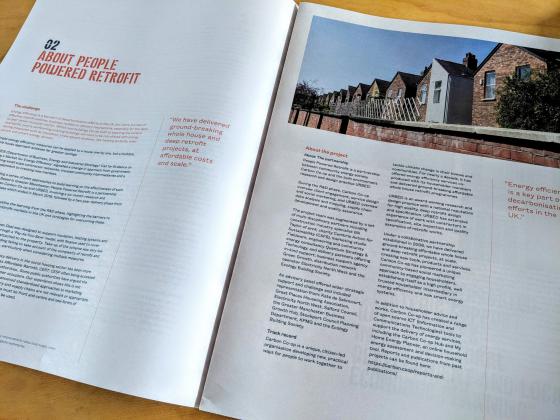As part of our People Powered Retrofit Project to develop a new market for retrofit in Greater Manchester, we have been looking at the role that the planning system plays and exploring how planning policy could be used.
In February 2019, we held a workshop in Manchester for planners from across the ten Greater Manchester Authorities, inviting them to share their thoughts on current retrofit policy and develop ideas with us. Here, planner Vicky Payne of URBED reflects on the session:
The event was well attended; all of the 15 planners who signed up were able to join us for the session. People Powered Retrofit partners, Carbon Co-op and URBED, are acutely aware of the pressures and financial constraints placed on Local Authority planners, and the last thing we wanted to do was prescribe measures that would be unhelpful, impractical or counterproductive!
Jonathan Atkinson of Carbon Co-op kicked off the session by explaining the background to People Powered Retrofit and as an introduction, we asked each planner how many cases of domestic retrofit they had dealt with in the last year. Although a few attendees handled such cases on an almost daily basis, the majority had rarely if ever encountered retrofit applications.
This led us neatly into the next section, where Marianne Heaslip of URBED gave a presentation on the context of retrofit. She highlighted that if Greater Manchester is to meet its carbon reduction targets, over 80% of the 1.17 million households in the city region are likely to need some form of wall insulation to meet carbon targets between now and 2038. To achieve this will require a whole house approach and a focus on quality materials and detailing. So, Greater Manchester planners are likely to see a significant increase in the number of retrofit applications they encounter.
In light of that we wanted to explore how planning policy could play a role in scaling up Greater Manchester’s retrofit efforts while maintaining quality. I have been undertaking a review of planning policy (see below) relating to domestic retrofit and presented the findings of my research so far. There is broad policy support at national level for sustainable development, but policies at a local level seem to include more general aspirations rather than detailed guidance. Where guidance does exist, it is often focused on new dwellings and developments over a certain threshold e.g. five units. The user experience for a homeowner accessing Local Authority resources can also be confusing.
Angie Jukes from Stockport Metropolitan Borough Council, offered us a possible way forward for Greater Manchester, presenting Stockport’s groundbreaking “Existing Dwellings Policy”. The policy states that:
“Planning applications for existing dwellings will be required where possible and practical to undertake reasonable improvements to the energy performance of the existing dwelling”
The policy provides a checklist for applicants, setting out common energy performance improvement measures, their estimated cost and the approximate time period in which homeowners can expect the measures to ‘pay back’. This checklist is requested by planners at the point of a planning application. During the following group discussion, attendees debated the merits of this approach and explored ways that it could be improved and implemented at a wider scale. There were some concerns that the policy generated additional work for already under-resourced planners and that applicants may have already reached an advanced stage with their application before being made aware of the requirements.
Marianne then presented an external wall insulation case study – in many cases the best technical solution to retrofit. The huge number of retrofits required could translate to around 700 external wall insulation domestic project per week in Greater Manchester between now and 2038 – with a consequent knock on in workload for planners and raising serious questions about how to carry out work on such a scale while maintaining quality. We explored the role that Permitted Development Rights currently play and how existing guidance is interpreted by different Local Authorities. Our group discussion asked how planners, designers, householders and contractors could play a role in delivering external wall insulation at scale.
Our final session focused on collaboration and improvement. Groups discussed how we might reduce the workload of planning officers whilst scaling up and maintaining quality and oversight in delivering domestic retrofit. We looked at how People Powered Retrofit might enable some of these measures, asking attendees to tell us their top three priorities that the project should focus on. Popular ideas included better guidance and signposting for householders, clearer policy and a greater role for Building Control. We wrapped up the afternoon by encouraging attendees to stay in touch and continue to engage with the project as it progresses.
Carbon Coop and URBED would like to thank everyone who came to share their knowledge and insights with us.


